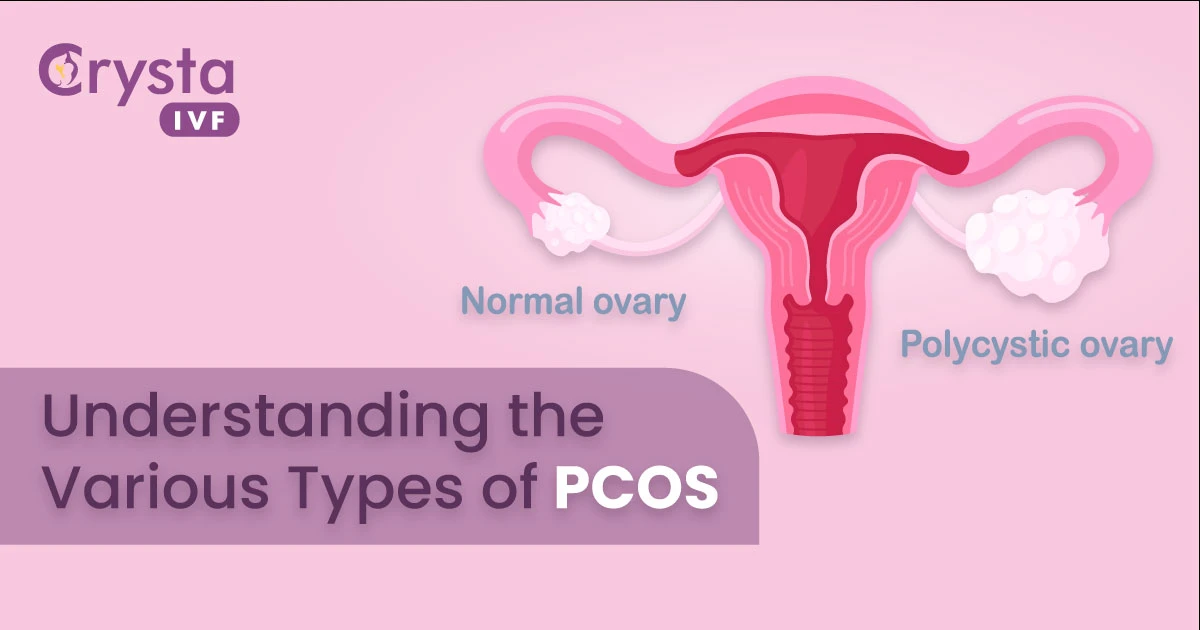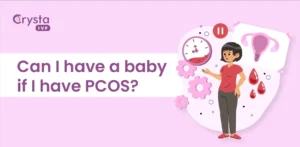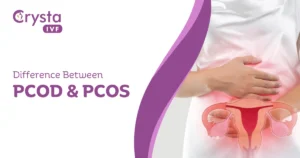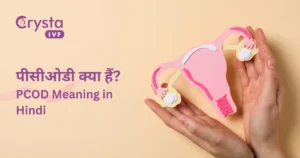Polycystic ovarian syndrome (PCOS) is a leading cause of infertility in women. According to the WHO, around 8–13% of women who are of reproductive age suffer from PCOS. Most of the time, PCOS remains undiscovered, leading to women not taking proper care of their health. As time passes, these PCOS cases keep on increasing, which is why awareness of the condition is important.
If you don’t know anything about PCOS or are confused about the symptoms, this blog is for you.
Keep reading, and you’ll learn everything about the condition.
What is PCOS?
PCOS (Polycystic Ovarian Syndrome) is a disorder in which women of fertile age face hormonal imbalances. This endocrine disorder is a cause of irregular periods and even an increase in the levels of androgen in women. PCOS fluctuates from time to time. It is not like if you have been diagnosed with PCOS. You will always be experiencing the symptoms; sometimes, people with PCOS do not see any symptoms for months or even years.
PCOS is not a curable condition. However, it can be kept in control with proper medication and lifestyle changes. As talked about before, many women remain undiagnosed with the condition and thus are not able to get treatment, which leads to infertility. Lack of awareness is the main reason for many women to know about their condition themselves.
One must know what causes PCOS and its symptoms to identify if they are suffering from the condition or not.
Also Read: Difference between PCOD and PCOS, Causes, Symptoms & Treatment
Symptoms of PCOS:
While the symptoms may vary and may not always be present, especially at an early stage, some of the common symptoms of PCOS are:
- Infertility
- Irregular periods or very light periods
- Excessive facial and body hair
- Baldness and hair thinning
- Excessive weight gain, especially in the abdominal area
- Acne and skin tags
While looking into the symptoms, one should know that one cannot show all the mentioned symptoms. If you have only 2–3 symptoms, this doesn’t mean you should be ignoring them. Always consult with your gynecologist to learn more.

Causes of PCOS
All the PCOS symptoms that are seen are normally caused by an increase in the levels of androgens in the female’s body.
- In research, it was found that PCOS can be hereditary. If your mother or sister has PCOS, you may suffer from the syndrome as well.
- Amount of insulin
The connection between PCOS and Period Irregularities
PCOS and period irregularities go hand in hand. The biggest symptom of PCOS is period irregularity or no period at all, and this happens because, in PCOS, ovulation becomes irregular.
Ovulation is the process by which the ovum is released from the ovary. When the male hormone androgen increases in the body, it automatically stops the release of eggs, resulting in irregular periods.
Types of PCOS
PCOS can be different for different people. It never has the same triggering causes for everyone. There are mostly four categories of PCOS:
Let’s explore them one by one.
Insulin-Resistant PCOS:
This is the most common type of PCOS found in women. It was discovered that out of 100 women who are diagnosed with PCOS, 70 of them have insulin-resistant PCOS. This condition mainly occurs when one’s body cells become resistant to insulin.
Insulin is the hormone that absorbs blood glucose and sends it to the cells. When cells become resistant to insulin, they won’t absorb the glucose from the blood, thus increasing the blood sugar in the body.
Insulin is responsible for the release of androgen in the body. When insulin levels in the body increase, androgen levels also increase, creating an imbalance of hormones, causing insulin-resistant PCOS.
Post-Pill PCOS
As the name suggests, post-pill PCOS is induced by the consumption of certain medicines. When someone has been taking any hormonal medicine (like birth control) for a long time, they can show these symptoms. This PCOS condition is mostly reversible if the person stops using the drug.
Note: The effects of those medicines take time to wear off. You must expect results after stopping the medication.
Inflammatory PCOS:
Low-grade inflammation is a chronic inflammation mostly caused after a major injury. This low-grade inflammation is responsible for developing inflammatory PCOS in one’s body. Most of the time, people try to avoid inflammatory diets and even take some medication at the suggestion of their doctors.
Adrenal PCOS
Adrenal glands help produce androgen hormones. Sometimes, due to certain conditions, the glands start secreting excessive amounts of androgens. As male hormones, Androgens start interrupting the process of ovulation, causing adrenal PCOS, which is the rarest of all types of PCOS.
People can consult their healthcare providers for suggestions and start taking medication accordingly. These medications, most of the time, control adrenal gland secretion, and the person returns to their regular lifestyle.
Also Read: Can I have a baby if I have PCOS?
Are there any diagnostic challenges in PCOS?
According to the WHO, out of the 13% of women who suffer from PCOS worldwide, most of them have it undiagnosed. Even if this is a very preventable condition in women of fertile age, it goes untreated because of a lack of awareness.
In India, the cases of PCOS have been increasing drastically over the past few years. People think it is taboo to talk about their periods, or most are uncomfortable talking to their gynecologist about their bodies. It is important to create awareness and to talk about the issues revolving around PCOS.
In many cases, the diagnosis is late, resulting in serious complications in the woman’s body.
What are the treatment options for different types of PCOS?
No cure has been found for PCOS until now. You can consult the doctor and follow their suggestions to prevent the severity of the condition.
These are a few things you can do in your process of managing PCOS:
- Consult your doctor, and if you are suffering from insulin-resistant PCOS, they may suggest taking diabetes medication. Diabetes medicines help maintain blood sugar levels, which are responsible for this type of PCOS.
- It is suggested that you take progesterone for some time to regulate your periods.
- Sometimes, if one is suffering from adrenal PCOS, the doctors suggest medication to control the secretion from the adrenal gland.
- Getting out of your comfort zone and making major changes in your lifestyle could be a game-changer.
- Eating healthy and doing regular workouts can be very productive for those with PCOS.
These are a few treatments that doctors usually suggest. However, it is important to take any medication only after a proper consultation with your doctor.
PCOS is common, and there is nothing to be ashamed of. You should first consult a gynecologist if you start experiencing any symptoms. Even though it is not curable, taking preventive measures will help you not suffer major fertility and health issues due to it. Most of the time, PCOS symptoms can be seen in adolescence itself. This is why parents need to make the child comfortable enough to discuss any bodily changes they may be experiencing.
Read More Blogs:
- What is PCOD: Everything You Need to Know?
- Diet Plan for PCOD and Healthy Tips
- Symptoms of PCOD Problem in Females and Treatment
- Low Testosterone in Females: Causes, Symptoms and Treatment
- How to Improve Egg Quality Naturally?




